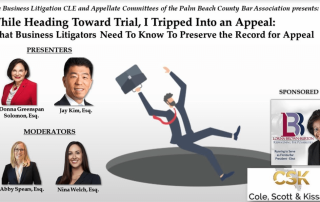Blog
The Difference Between Appellate Jurisdiction and Original Jurisdiction
When we consider bringing a lawsuit, we will often discuss whether a court has jurisdiction to hear a particular case. The word ‘jurisdiction’ means that the court has the legal [...]
A Step-by-Step Guide to Writing an Appellate Brief
Writing an appellate brief that is effective and persuasive requires a unique skill set. The quality of your appellate brief will affect your likelihood of success on appeal. In most [...]
What are the Possible Outcomes of an Appeal?
A civil appeal is not simply another trial in front of a new judge. Instead, when you appeal a civil verdict, your lawyer will need to present a legal argument [...]
Live Webinar Wednesday: “While Heading Toward Trial I Tripped into an Appeal: What Business Litigators Need to Know to Preserve the Record for Appeal”
This Wednesday, Donna Solomon will be presenting at "While Heading Toward Trial I Tripped into an Appeal: What Business Litigators Need to Know to Preserve the Record for Appeal." The [...]
What Happens After You Win an Appeal in Florida?
You have been through a daunting trial in civil court in Florida. Unfortunately, you lost your case. Now you are hoping to appeal your case and win. Appealing your case gives you [...]
Can You Appeal an Appellate Court Decision in Florida?
The person who loses at the trial court level has a right to appeal the decision to a higher court. The appellate court will review the lower court's decision and [...]
Latest Arbitration Case Law Update, Published in Palm Beach County Bar Association Bulletin
See below for the complete text of Donna Greenspan Solomon's latest arbitration case law update. To see the original article, please visit PalmBeachBar.org/bar-bulletin-magazine/ . -------------------------------------------------------------------------------------------------------------------------------------------------------- GE Energy Power Conversion Fr. [...]





